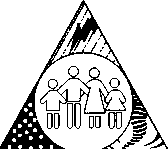|
HURRICANE • FLASH FLOOD •
HAZARDOUS MATERIALS SPILL • EARTHQUAKE • TORNADO • WINTER STORM
• FIRE
FAMILY EMERGENCY PREPAREDNESS Helping
Children Cope with Disaster Earthquakes... tornados...fires...floods...hurricanes... hazardous materials
spills... ********** Disasters
strike quickly and without warning. These events can be traumatic for adults, but they are frightening
for children if they don't know what to do. During a
disaster, children may have to leave their homes and daily routines.
They may become anxious,
confused or frightened. As an adult, you'll need to cope with the disaster and also give your children
crucial guidance about how to respond. The Federal
Emergency Management Agency (FEMA) and the American Red Cross have
prepared this brochure to help you help your children cope. Ultimately,
you should decide what's best for your children,
but consider using these suggestions as guidelines.
Children and Their Response to Disaster Children
depend on daily routines: They wake up, eat breakfast, go to school,
play with friends. When emergencies
or disasters interrupt this routine, children become anxious. In a
disaster, they'll look to you and other adults for help. How you react
to an emergency gives them clues about how to act. If you react with
alarm, a child
may become more scared. They see our fear as proof that the danger is
real. Children's
fears also may stem from their imagination, and you should take these feelings seriously. A
child who feels afraid is afraid. Your words and actions
can provide reassurance. Feelings of
fear are healthy and natural for adults and children. But as an adult, you need to keep control of
the situation. When you're sure that danger has passed,
concentrate on your child's emotional needs by asking the child to
explain what's troubling him or her. Your response during this
"problem time" may have
a lasting impact. Be aware
that after a disaster, children are most afraid
that — •
the event will happen again. •
someone will be injured or killed. •
they will be separated from the family. •
they will be left alone.
|
|
HELPING CHILDREN COPE WITH DISASTER Advice to Parents: Prepare for Disaster You can
create a Family Disaster Plan by taking four simple steps. First, learn what hazards exist in your
community and how to prepare for each. Then meet with your family to discuss what you would do, as a
group, in each
situation. Next, take steps to prepare your family for disaster such as:
post emergency phone
numbers, select an out-of-state family contact, assemble disaster
supplies kits for each member of your household and install smoke
detectors on each level
of your home. Finally, practice your Family Disaster
Plan so that everyone will remember what to do when a -disaster does occur.
Develop and practice a Family Disaster
Plan.
Contact your local emergency management or civil defense
office, or your local Red Cross chapter for materials that describe how
your family can create a
disaster plan. Everyone in the
household, including children, should play a part in the planning
process.
Teach your child how to recognize danger signals. Make
sure your child knows what smoke detectors, fire alarms and
local community warning systems (horns, sirens) sound
like. Explain
how to call for help. Teach
your child how and when to call for help. Check the telephone
directory for local emergency phone numbers and post these phone numbers
by all telephones.
If you live in a 9-1 -1 -service area, tell
your child to call 9-1 -1. Help your
child memorize important family information. Children should memorize their family name, address and
phone number. They should
also know where to meet in case of an emergency. Some children may not be old enough to memorize
the information. They could carry a small index card to give to an adult or babysitter that
lists emergency information. TEACHING YOUR CHILDREN HOW TO
CALL FOR HELP Teach your child how and when to call for help. They should call 9-1-1 if you
live
in a 9-1-1
service
area. If not, check the telephone directory for your local emergency
numbers.
Even very young children can be taught how
.
|
